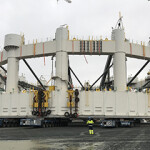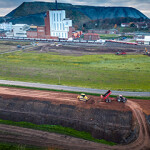SalMar subsidiary gets green light to convert development licenses

Ocean Farming AS, a subsidiary of Norwegian salmon producer SalMar ASA, has been granted permission to convert its eight development licenses into ordinary fish production licenses, SalMar CEO Gustav Witzøe has confirmed.
The Norwegian Directorate of Fisheries informed the company of its decision in a letter dated 7 July, 2020. The eight licenses granted to SalMar in February 2016 for the realization of its offshore fish farming facility Ocean Farm 1 can now be included in its ordinary production, within the framework and regulations governing maximum allowable biomass (MAB).
In a statement, Witzøe said that in the Directorate of Fisheries’ decision it had expressed that Ocean Farming had provided comprehensive and thorough documentation showing that the performance criteria and the conditions for conversion had been fulfilled.
The experience gained through the project has been described and reported to Norwegian Directorate of Fisheries, most recently in the form of a final report and a separate report on the development of the project in the first half of 2020, he said. The reports are now publicly available.
“In this way, the knowledge deriving from the project will benefit the entire aquaculture sector, as required by the regulations underpinning the development license scheme,” Witzøe said. “SalMar is proud that we have completed a project that we believe to be a groundbreaking step towards the development of an even more sustainable aquaculture sector.”
The company invested approximately NOK 1 billion (USD 106.6 million, EUR 94.1 million) in the design and development of Ocean Farm 1, with over 50 percent of this amount spent on services and equipment from Norwegian companies.
Witzøe said that the Ocean Farm project would have been “impossible to realize without the development license scheme,” which the government introduced in 2015.
“The Norwegian authorities, together with the industry, have triggered technological breakthroughs that will strengthen Norway's position as a leader in new technology that can contribute to sustainable growth in the aquaculture industry,” Witzøe said.
Conversion of these licenses will not affect the operation of Ocean Farm 1, which is currently approaching the end of its second production cycle. It will remain a part of SalMar’s fish-farming operations.
The company has also launched a project to investigate the financial and technical conditions necessary to build additional units with a similar design to Ocean Farm 1 for deployment in more exposed positions within the area of application of the Norwegian Planning and Building Act.
“Our experiences from Ocean Farm 1 reinforce SalMar’s firm belief in offshore farming,” Witzøe said.
According to SalMar’s latest trading update, it harvested 40,900 metric tons (MT) of gutted fish in the second quarter of this year, some 500 MT less than in the corresponding period of 2019.
The contribution from the company’s farming operations in central Norway amounted to 27,200 MT (up from 24,600 MT in Q1 2019), while its northern Norway sites provided 12,000 MT (down from 14,100 MT). Its Icelandic subsidiary Arnarlax provided 1,700 MT (down from 2,800 MT).
SalMar’s full Q2 2020 results will be published on 27 August, 2020.
Its first-quarter 2020 harvest amounted to 40,000 MT, up from 35,500 MT a year previously.






Share